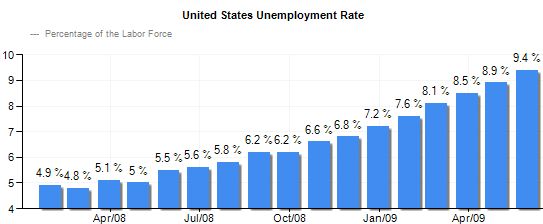
THE WORSENING unemployment situation is a major theme in financial media, and the worsening climate in the US in both big cities and smaller towns is worthy of note. Here is the view from a reporter at the China Finance Daily, which I have translated.
My American friend, Emily, called me the other day saying she had been let go by her company. When I heard it, my heart went out to her, and I thought: “These days, every day everyone worries about getting this news someday, and her day has finally come.”
She began working last year at a major retail firm in the US, which has until late been performing very admirably. But with the drastic fall in foot traffic in the US, and moribund consumer sentiment, her company’s sales plummeted, and this all made me very concerned for her. When I asked her how she saw things working out, she said it was unlikely the US economy would turnaround in any significant way for at least five years.
“My goodness, are you serious?” I asked.
But this was not the first time I heard this temporal scenario. I am full of hope that by year-end, the US economy will make a turn for the better. But what about this dour five-year hiatus estimate? It really can make an optimist like myself start doubting himself. One weathervane to monitor the crisis is a town just across the California border in Mexico – El Centro City. The jobless rate there is 26.9%.
The California State Government in February announced it was entering a budgetary boiling point, which reached a historic crisis state by the end of the first half. I saw an influential editorial that actually called for drastic cuts in state programs and public assistance.
This led to an immediate and strong reaction from the reading public, as well as an impassioned response from netizens. Emily is the third California-based friend of mine to recently join the ranks of the unemployed.
After getting their pink slips, they all to a tee began cutting back on discretionary spending wherever possible, and avoided restaurants and shopping like the plague. They also began to forgo their habitual entertainment and workout routine habits, and basically put a self-imposed moratorium on leisure travel. In this way they relieved a lot of psychological pressure associated with attempting to self-bankroll a lifestyle they couldn’t afford.
From both media scrutiny and my own personal observations, I noticed two definite changes. Those still holding down jobs are working even harder to keep them, and are putting in longer hours and even coming in on weekends.
They are improving their interpersonal and schmoozing skills out of a self-perceived survival-mode necessity in hopes to have a stable job situation. And those out of work are desperately pounding the pavement looking for any gainful – or otherwise – opportunity out there. They are mainly still driven by a flicker of hope that things will get better and someone still needs there skills and services.
Hope springs eternal…
I have an American friend whose daughter recently graduated from college who finally found a job at an investment management company doing basic clerical work. She only found this most basic and entry-level of positions after a long, arduous, and trying job-search odyssey. I remember she started the process several months previously.
Over the several encounters I had with her over the ordeal, she was constantly in a state of panic that nothing positive would result from the extended search. In the process, I kept offering her words of encouragement, knowing full well how empty, clichéd and hackneyed they might sound to a cynical jobless person’s ear.
But now that she is actually on someone’s payroll, my well-worn words of encouragement do not seem as meaningless, and perhaps it is – after all -- hope alone that can keep us persevering in such a bearish job market.
 NextInsight
a hub for serious investors
NextInsight
a hub for serious investors
Feeling the impact of US unemployment: a writer’s opinion
- Details
- Andrew van Buren (China correspondent)
Source: US Bureau of Labour Statistics.
You may also be interested in:

|
XIAO NAN GUO profit warning: China's catering industry feeling austerity bite |

|
JUST ASK: "Trying to make $6K profit a month. Feeling frustrated" |
